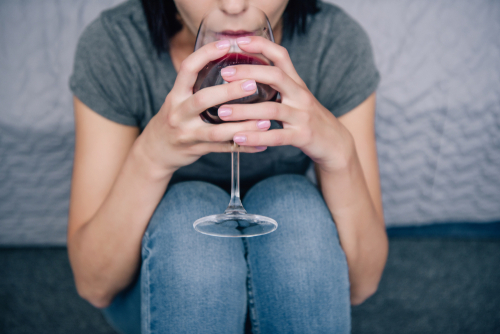Stressed out parents of all abilities flippantly toast to “Mommy Wine Culture” because, well, wine has become an acceptable coping mechanism to deal with kids’ whining and other stressors. These days, there’s no shortage of humorous “Mommy needs wine” etched glasses, t-shirts and memes. And for many mothers (and fathers), consuming wine or another type of adult beverage is perfectly fine and even beneficial. But for others — including some people with disabilities, parents of children with special needs and caregivers — Mommy Wine Culture can be more hazardous than humorous.
Why Do Moms Embrace Mommy Wine Culture?
Managing the demands of family life is tricky for all parents and, usually, even more so for parents with disabilities and parents of children with special needs. Parents often struggle to find a healthy balance to do it all, which is why some seek an escape with a glass of red, white or rose vino.
More than 80% of the moms surveyed by Parents said the top reason they drink is to relax and unwind from the stresses of parenting. But is this approach to relaxation worth the risk? Statistics show that women are at greater risk than men for alcohol-related health problems, including liver inflammation, cardiovascular diseases and certain cancers, according to the National Institute of Alcohol Abuse and Alcoholism.
Increasing in popularity, Mommy Wine Culture is perceived as casual consumption, but this low-key theory may have high stakes. Mommy Wine Culture may unintentionally encourage and/or lead to binge drinking which, according to the CDC, is a serious yet preventable public health problem. Binge drinking is defined as consuming five or more drinks on an occasion for men, or four or more drinks on an occasion for women. Binge drinkers are not dependent on alcohol; still, binging increases risk of chronic diseases, memory/learning issues and other debilitating conditions.

Is the Disability Community More Vulnerable to Mommy Wine Culture?
When you’re the mother, father or guardian of a child with special needs, various parenting stressors are undoubtedly magnified. Therefore, people aligned with the disability community may have a greater risk associated with Mommy Wine Culture. Think about every typical parenting scenario being amplified by a disability factor: Picky-eater battles complicated by medically necessary dietary restrictions; outfit debates impacted by sensory-triggering garments; playdates demanding logistical modifications; extra-curricular activities sidelined because of frequent doctor’s appointment.
Besides parenting and/or caregiving a person with special needs, adults with their own disabilities experience substance use disorders two- to four times the rate of the general population, according to Addiction Center. Due to mental and physical disabilities, some people can experience severe depression and anxiety, turning to substances to cope. Another source, Alcohol Help, notes that people with intellectual and developmental disabilities (I/DD) may also be more vulnerable to alcohol for a number of reasons, like trauma, mental disorders and masking to fit into a social setting.
Alcohol may heighten symptoms of conditions as well. A study published in the Journal of Autism and Developmental Disorders found that children from high alcoholism families were more likely to have the onset of their autistic behavior occur with a loss of language. This occurred primarily in families where the mother drank, suggesting an association between maternal alcoholism and regressive onset autism. Another study from Sweden, reported by The Atlantic, suggests that people with autism who have average or above-average intelligence quotients (IQs) are more than twice as likely to become addicted to alcohol or other substance compared to peers. The risk is even higher for people who also have attention deficit hyperactivity disorder (ADHD). Furthermore, a UK-based rehab center says that people with ADHD, who often struggle with impulse control and emotional regulation, are five- to ten times more likely to have alcohol addiction than those without this neurodiverse diagnosis.

Is Mommy Wine Culture That Risky?
Approximately 65% all U.S. adults self-report drinking alcohol occasionally, many of which do so without issues. A survey by the Wine Market Council found that consumers attested that wine “is healthier than most alcoholic beverages.” But is wine really healthy?
The debate over alcohol intake is a doozy. That’s because its effects on a person’s wellbeing have been described as a double-edged sword. Drinking too much alcohol may increase risk of an array of health problems, as previously noted, including cancer, depression, high blood pressure, liver disease, obesity, stroke, suicide and, of course, alcoholism. However, studies have also found that drinking can be beneficial when done safely in moderation.
According to research presented at the American Heart Association’s 2022 Epidemiology and Prevention, Lifestyle and Cardiometabolic Health conference, drinking a glass or two of wine with meals – but not at other times – may help lower the risk of developing Type 2 diabetes. This latest finding focused on when consumption takes place versus quantity of glasses consumed. This positive conclusion comes after previous findings cited that red wine may be good for heart health because it contains antioxidants such as resveratrol, which can reduce cholesterol, blood pressure and inflammation, and prevent other chronic conditions.
Does Wine Relieve Stress?
A University at Buffalo-led study found that the plant compound resveratrol, which is found in red wine, does display anti-stress effects by blocking the expression of an enzyme related to the control of stress in the brain. Thus, raising a glass may lower tension levels for some people. The researchers even suggested that the intake of resveratrol could help people struggling with specific debilitating conditions.

“Resveratrol may be an effective alternative to drugs for treating patients suffering from depression and anxiety disorders,” Ying Xu, MD, PhD, co-lead author and research associate professor in the UB School of Pharmacy and Pharmaceutical Sciences, shared in a press statement.
Resveratrol is a compound found in the skin and seeds of grapes and berries; so, wine is not the only potential intake source.
What is Sober Curious?
Sober mom advocate Celeste Yvonne is a certified recovery coach (IAPRC). In her new book, It’s Not About the Wine: The Loaded Truth Behind Mommy Wine Culture, Yvonne helps readers recognize, in many instances, that Mommy Wine Culture is mostly a distraction from what we really need.
“The goal of this book is to look at why we mothers turn to alcohol as a solution in the first place and to help us all find ways to fix the underlying problems we face,” says Yvonne, a Nevada-based mother who no longer embraces Mommy Wine Culture. She believes that the buzz around booze is merely a symptom of larger issues: the mental load of modern motherhood, which includes an imbalance from outdated family norms, traditional roles and a systemic lack of support for moms — all of which impact mental health.
“There is absolutely nothing to be ashamed of in our sober journeys. The more people who speak up and talk openly about addiction, recovery and sobriety, the more people struggling will feel safe to seek help, open up or simply recognize the problem. I imagine a future where binge drinking isn’t an expected part of the college experience, where friends meeting up for drinks automatically includes both alcoholic and nonalcoholic options, and where a mother struggling elicits genuine concern and offers of support instead of jokes about wine being the solution to anything that ails her. What an inclusive, supportive, glorious world that would be!”

Some mothers are championing a “sober curious” movement. In fact, Yvonne, who is five years sober, is also the founding host of the Sober Mom Squad, a platform aimed at supporting mothers who are struggling with alcohol, mental health and other concerns.
Final Round of Wine
Experts recommend no more than one to two drinks per day for men and one drink per day for women. So, if it’s safe for you, there is no shame in enjoying a glass of wine. Cheers to you! But know that you also deserve the right to choose other coping mechanisms. Need some ideas, click over to AmeriDisability’s article featuring self-care strategies.
[Note: If you drink, do drink responsibly and always use a designated driver.]






